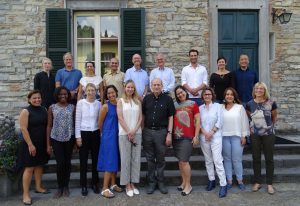
Rear from Left : Meredith Bonner, Rice University, Jim Chandler, University of Chicago, Amel Karboul, Education Outcomes Fund, Africa, Middle East, Jamshed Bharucha, SRM University, Amaravati, John Mitchell, Stanford University, Bror Saxberg, Chan Zuckerberg Initiative, Timo Kos, Delft University of Technology, Sarah Stein Greenberg, Stanford University, Robert Lue, Harvard University
Front from Left: Susan Winslow, MacMillan Learning, Tolu Agunbiade, African Leadership University, Londa Schiebinger, Stanford University, Mariko Silver, Bennington College, Caroline Levander, Rice University, David Leebron, Rice University, Cecilia Paredes Verduga, Escuela Superior Politécnica del Litoral, Robyn Norton, The George Institute for Global Health, Shireen Yacoub, Edraak, Deanna Raineri, Coursera
August 28, 2018, Bellagio Center, Italy: SRM University – AP, Amaravati had the honour of being represented at one of the most prestigious education events in the world – a 4-day working conference hosted by the New York based Rockefeller Foundation.
Vice Chancellor Dr. Jamshed Bharucha, SRM University – Andhra Pradesh, joined a select gathering of twenty higher education and intellectual thought leaders invited to produce a model action plan for the future university as a vibrant global force.
The conference was structured around issues that speak to the why, who, what and how of global education.
It is the brainchild of John Mitchell (Professor of Computer Science and former Vice Provost at Stanford), Robert Lue (Harvard), and Simone Buitendijk (Imperial College, Leiden University Medical Centre). Participants included David Leebron, President of Rice University and Jim Chandler of the University of Chicago.
At a time when the needs are far greater than the capacity of any single institution, the mandate was to bring together the world’s most innovative and entrepreneurial minds to devise a suitable approach to strategic planning.
Recognizing that global challenges cannot be solved by any one discipline methodology, or accepted set of scholarly practices, the participants examined ways to architect a truly inclusive university that knows no impediments to world-wide learning and applied research collaboration.
“Traditional universities are not designed to address the surging global demand for quality higher education”, Dr. Bharucha points out, “We explored innovative solutions that create networks of universities and employ the best technology to bring students and faculty together from across the world. SRM Amaravati already plays a key role in this endeavour being the only participating institution that has the capacity to innovate and be agile in ways that entrenched institutions cannot.”
The question of what kind of a work force will be best equipped for the future underscores a pressing need for a global ecosystem that supports accessible, diverse, varied and effective lifelong learning. A dramatic shift is already underway in how universities teach and how they engage students in learning and preparing for their futures.
World-class research, for example, is a global project and truly global universities like SRM recognize the benefits of strategic partnerships with other universities, with businesses, with civil society, with governments; and also are quick to adopt systems and practices that have global relevance.

